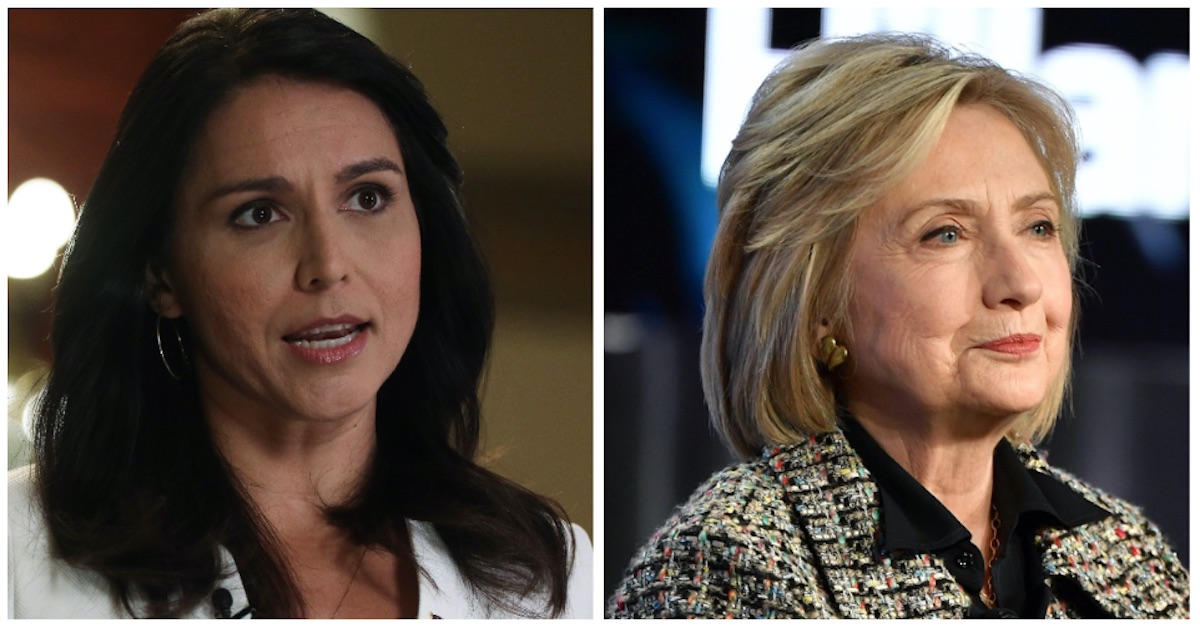
Looks like Tulsi Gabbard (D-Hawaii) just hoisted herself up onto the moral high ground while making a completely nonsensical excuse for utterly wasting a federal court’s time. Gabbard voluntarily withdrew her defamation lawsuit against Hillary Clinton on Wednesday, on grounds that there are simply more important things in life than defending herself from being called a Russian asset.
Back in January, when Gabbard was still a presidential candidate, she sued Clinton for defamation; the back-and-forth between the two was straight out of Mean Girls.
Clinton had said that Gabbard was “the favorite of the Russians,” that she was supported by “a bunch of sites and bots,” and that she (as well as Jill Stein) was “a Russian asset.” Gabbard responded, calling Clinton the “queen of warmongers,” and then sued Clinton when she refused to retract her statements.
Gabbard’s defamation complaint’s undeniable subtext was to call out Clinton for being a giant failure. Nestled in its allegations that Clinton caused major financial harm to Gabbard’s campaign were comments that: “Clinton has long coveted, but has not been able to attain,” the presidency; that Clinton was a two-time loser in races she was widely expected to win.
Now, though, Gabbard seems committed to being the bigger person. She filed a voluntary dismissal of her own case. She insisted that she definitely could have won the defamation case, but that she’s just too busy with more important stuff right now. Yes, seriously.
Gabbard’s notice of voluntary dismissal to the United States District Court for the Southern District of New York reads as follows:
“While [plaintiffs] remain certain of the action’s legal merit, they are just as certain that this new COVID and post-COVID world require them to focus their time and attention on other priorities, including defeating Donald Trump in 2020, rather than righting the wrongs here.”
Right, because that’s what plaintiffs with super strong cases do. They file cases just for fun, and then withdraw them before discovery begins and after the defendant files a motion to dismiss. Absolutely nothing is suspect about that.
More broadly, what the hell is going on with this new COVID-as-catchall-excuse? What, exactly, is Tulsi Gabbard doing to cure the pandemic that renders her unable to cooperate with her own lawsuit? Perhaps she is taking her cues from President Donald Trump’s lawyer, Jay Sekulow, who made the same excuse to the Supreme Court recently on behalf of the president.
During oral arguments, Sekulow contended that Trump shouldn’t have to comply with subpoenas for his tax returns because he’s too busy responding to the pandemic. That argument was unlikely to get much traction from Justice Stephen Breyer, who’d already pointed out that Trump could simply hire a lawyer to handle the bulk of the time burdens effectuated by litigation; we’ll have to wait and see whether any other justices bought what Sekulow was peddling.
As for Gabbard, her citing of COVID-19 is even more ludicrous, as she is the one who initiated the lawsuit against Clinton on January 22, 2020. While the severity of this pandemic was unknown to us at the time, there is no logical nexus between the novel coronavirus and Gabbard’s defamation claim. If she’d actually suffered compensable harm as a result of Clinton’s false statement, Gabbard would be just as able to prove it now as she would have in January.
As for the “defeating Trump is our top priority” rationale, it’s tough to see how 1) things are demonstrably different in May than they were in January when Gabbard started this lawsuit; or 2) how suing Hillary Clinton was ever meant to galvanize voters against Trump. I appreciate Gabbard’s attempt to cast herself as a country-before-self patriot, but the whole thing smacks of phoniness.
Now might also be a good time to issue a reminder about Federal Rule of Civil Procedure 11. That’s the one that prohibits frivolous lawsuits, defined as any that are “presented for any improper purpose, such as to harass, cause unnecessary delay, or needlessly increase the cost of litigation.” Under the rules, parties can face sanctions if a court determines that a lawsuit was filed frivolously.
[Image via Alex Wong/Getty Images, Amy Sussman/Getty Images]
This is an opinion piece. The views expressed in this article are those of just the author.